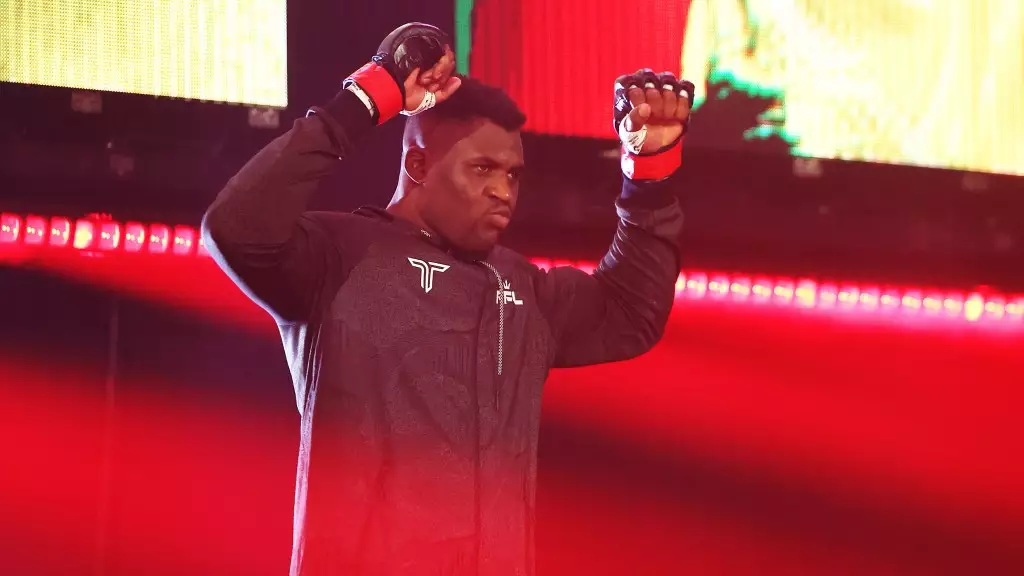Francis Ngannou’s departure from the UFC marks a significant shift in the landscape of mixed martial arts, as the heavyweight champion sought not only financial security but also creative freedom in a sport that is often controlled by promotional entities. The recent TKO victory over Renan Ferreira at PFL: Battle of the Giants showcased Ngannou’s return to the cage, but it also reignited discussions about his contentious relationship with UFC president Dana White. This dynamic between Ngannou and White, characterized by conflicting narratives, has captured the attention of fans and commentators alike.
Ngannou’s initial journey within the UFC was meteoric, culminating in a championship reign that established him as one of the sport’s most fearsome competitors. However, his decision to leave UFC after his fight against Ciryl Gane in January 2022 raised eyebrows. White’s public comments following Ngannou’s recent success reveal a palpable tension. His remarks imply that Ngannou’s motivations were driven largely by financial considerations, suggesting that he left the UFC out of fear of losing money and marketability, especially in a potential bout against the legendary Jon Jones. This narrative not only belittles Ngannou’s achievements but also reflects White’s personal disdain as the UFC experiences a shift without its heavyweight champion.
On the surface, Ngannou has remained poised and diplomatic in response to White’s criticisms. He emphasizes the importance of staying above the fray. When he was asked about White’s continued barbs, Ngannou reiterated, “I’m not about him.” His priority appears to be honoring his commitments to his family and his late father, who inspired him in his pursuit of success. This shifts the focus away from personal animosity and back to what truly matters to him: his career and legacy.
In a sense, Ngannou’s stance reinforces the contrasts between the two figures; where White seemingly relishes the confrontation, Ngannou chooses to rise above it. His comments encourage a broader understanding of personal motivations behind professional decisions. He suggests that rather than continuing to vilify him, White could simply acknowledge the end of their business relationship with grace. This call for mutual respect between former partners highlights a common theme in sports: the need to maintain dignity, even amidst professional disputes.
The motivations behind Ngannou’s decisions extend beyond mere financial gain; they encapsulate a desire for newfound autonomy. His inability to reach a mutually beneficial contract with the UFC stemmed from the organization’s reluctance to allow him to pursue boxing opportunities. Ngannou’s later success with PFL opened doors for him to compete against some of the biggest names in boxing, such as Tyson Fury and Anthony Joshua, which speaks to his ambition and willingness to transcend traditional boundaries within fighting sports.
However, White’s commentary suggests an alternative narrative that frames Ngannou as a fighter who chose security over risk. This perspective may stem from White’s need to preserve the UFC’s reputation and viability, particularly as it relates to the fighters who are still part of the promotion. Ngannou seems to have found empowerment outside of White’s shadow, which may assuage his earlier fears of a diminishing career by maximizing his profitability through diverse fight contracts.
As Ngannou navigates his new path, he often speaks to the significance of personal triumph. His comments about biking back from his fights symbolize resilience, particularly in overcoming early life struggles that nearly overshadowed his rise. “I won everything,” he boldly declares, emphasizing that success is not merely measured in financial terms but also in personal and professional fulfillment.
The enduring impact of Ngannou’s departure from the UFC raises questions about the future landscape of both organizations. As the UFC grapples with changes in its heavyweight division, the rise of Ngannou in PFL may encourage other fighters to seek alternatives beyond the UFC’s monolithic structure.
Ultimately, Ngannou’s narrative intertwines issues of autonomy, financial empowerment, and self-respect in a sport often plagued by rigid contracts and promotional limitations. As he continues his career, the dialogue surrounding his decisions will serve as a critical reference point for future fighters, advising them on the importance of not only fighting hard within the cage but also standing firm outside of it.

